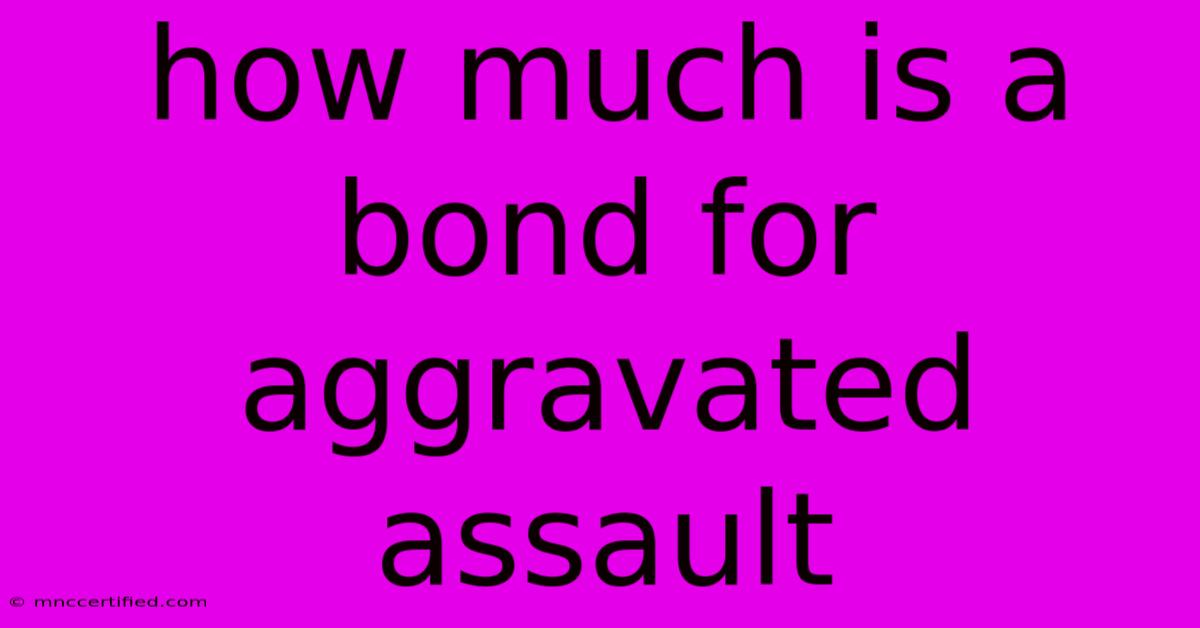How Much Is A Bond For Aggravated Assault

Table of Contents
How Much is a Bond for Aggravated Assault? A Guide to Understanding Bail
Aggravated assault is a serious offense with potentially severe consequences, including jail time. Understanding the bail process, including the bond amount for aggravated assault, is crucial if you or someone you know is facing these charges. This article will provide a comprehensive overview of factors influencing bond amounts and the steps you can take if you're navigating this legal process.
What is Aggravated Assault?
Aggravated assault is a criminal offense that involves an intentional act causing serious bodily injury or using a deadly weapon. It's considered a more serious offense than simple assault due to the increased risk of harm.
Factors Affecting Bond Amount for Aggravated Assault
The bond amount for aggravated assault is determined by a judge based on various factors, including:
- Severity of the offense: The nature of the assault, the injuries sustained by the victim, and the use of a weapon significantly influence the bond amount.
- Criminal history: Previous offenses, particularly violent crimes, increase the likelihood of a higher bond.
- Flight risk: Judges assess the likelihood of the defendant fleeing the jurisdiction to avoid prosecution.
- Community ties: Strong community ties, such as family, employment, and residence, can reduce the perceived risk of flight.
- Financial resources: The defendant's ability to pay the bond is considered, but it's not the sole determinant.
- Jurisdiction: Bond amounts can vary significantly between states and even within different counties.
Understanding the Bail Process
After an arrest for aggravated assault, the accused will typically be brought before a judge for a bond hearing. During this hearing, the prosecution will present evidence to justify the charges, and the defense can argue for a lower bond. The judge will then make a decision based on the factors listed above.
Types of Bonds
Several types of bonds are available for aggravated assault cases:
- Cash bond: The defendant pays the full bond amount in cash, which is returned upon appearance in court.
- Surety bond: The defendant pays a percentage of the bond amount to a bail bondsman, who guarantees the defendant's appearance in court.
- Property bond: The defendant uses real estate as collateral for the bond.
- Personal recognizance: The defendant is released without paying a bond, based on their promise to appear in court.
Legal Advice is Crucial
Navigating the bail process can be complex and stressful. If you or someone you know faces aggravated assault charges, it's crucial to consult with an experienced criminal defense attorney as soon as possible. An attorney can:
- Understand the specific charges and potential penalties.
- Advise on the best course of action for the bond hearing.
- Negotiate with the prosecution on your behalf.
- Represent you in court throughout the legal process.
Conclusion
Aggravated assault is a serious charge with potentially significant legal consequences. Understanding the factors that affect bond amounts and the bail process is crucial. Seeking legal advice from a qualified attorney can provide essential guidance and support throughout this challenging experience.
Keywords: aggravated assault, bond, bail, criminal offense, legal process, bond hearing, flight risk, community ties, financial resources, jurisdiction, cash bond, surety bond, property bond, personal recognizance, criminal defense attorney, legal advice

Thank you for visiting our website wich cover about How Much Is A Bond For Aggravated Assault. We hope the information provided has been useful to you. Feel free to contact us if you have any questions or need further assistance. See you next time and dont miss to bookmark.
Featured Posts
-
Lineups Announced Bayern Munich Vs Benfica
Nov 07, 2024
-
Lipedema Liposuction Covered By Insurance
Nov 07, 2024
-
Bitcoin Price Outlook Trump Victory Fuels 78 000 Target
Nov 07, 2024
-
Christian Brothers Insurance Find A Doctor
Nov 07, 2024
-
Naomi Biden Sets Election Day Date
Nov 07, 2024